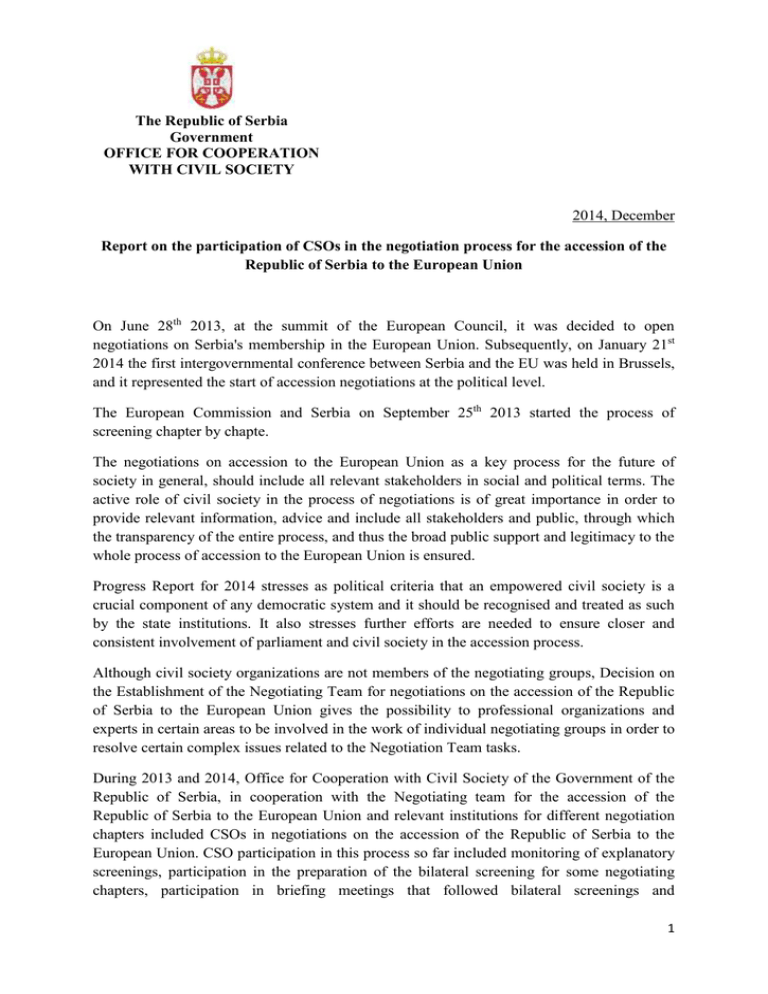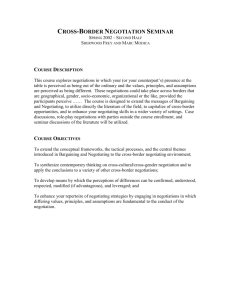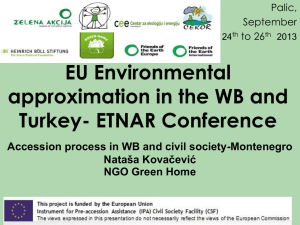Report on the participation of CSOs in the negotiation process for
advertisement

The Republic of Serbia Government OFFICE FOR COOPERATION WITH CIVIL SOCIETY 2014, December Report on the participation of CSOs in the negotiation process for the accession of the Republic of Serbia to the European Union On June 28th 2013, at the summit of the European Council, it was decided to open negotiations on Serbia's membership in the European Union. Subsequently, on January 21st 2014 the first intergovernmental conference between Serbia and the EU was held in Brussels, and it represented the start of accession negotiations at the political level. The European Commission and Serbia on September 25th 2013 started the process of screening chapter by chapte. The negotiations on accession to the European Union as a key process for the future of society in general, should include all relevant stakeholders in social and political terms. The active role of civil society in the process of negotiations is of great importance in order to provide relevant information, advice and include all stakeholders and public, through which the transparency of the entire process, and thus the broad public support and legitimacy to the whole process of accession to the European Union is ensured. Progress Report for 2014 stresses as political criteria that an empowered civil society is a crucial component of any democratic system and it should be recognised and treated as such by the state institutions. It also stresses further efforts are needed to ensure closer and consistent involvement of parliament and civil society in the accession process. Although civil society organizations are not members of the negotiating groups, Decision on the Establishment of the Negotiating Team for negotiations on the accession of the Republic of Serbia to the European Union gives the possibility to professional organizations and experts in certain areas to be involved in the work of individual negotiating groups in order to resolve certain complex issues related to the Negotiation Team tasks. During 2013 and 2014, Office for Cooperation with Civil Society of the Government of the Republic of Serbia, in cooperation with the Negotiating team for the accession of the Republic of Serbia to the European Union and relevant institutions for different negotiation chapters included CSOs in negotiations on the accession of the Republic of Serbia to the European Union. CSO participation in this process so far included monitoring of explanatory screenings, participation in the preparation of the bilateral screening for some negotiating chapters, participation in briefing meetings that followed bilateral screenings and 1 participation in drafting Action plan for Negotiating Chapter 23 - Judiciary and Fundamental Rights. 1. Web streaming of explanatory screening Web streamings of explanatory screening were organized for Chapter 1 (Free movement of goods) 2 (Freedom of movement for workers), 3 (Ri ght of establishment and freedom to provide services), 4 (Free movement of capital), 5 (Public procurement), 6 (Company law), 7 (Intellectual property law), 8 (Competition policy), 10 (Information Society and Media), 11 (Agriculture and Rural Development), 12 (Food safety, veterinary and phytosanitary policy), 13 (Fisheries), 14 (Transport policy), 15 (Energy), 16 (Taxation), 17 (Economic and monetary policy), 18 (Statistics), 19 (Social policy and employment), 20 (Enterprise and industrial policy), 21 (Trans-European networks), 22 (Regional policy and coordination of structural instruments), 23 (Judiciary and Fundamental Rights), 24 (Justice, Freedom and security), 25 (Science and research), 26 (Education and Culture), 27 (Environment), 28 (Consumer and health protection), 29 (Customs Union), 30 (External relations), 31 (Foreign, security and defence policy), 32 (Financial Control). All calls for monitoring the web streaming of explanatory screening were public and were posted on the Office official website. More than 500 representatives of relevant CSOs attended web streaming of explanatory screening for all these chapters. 2. Preparation of bilateral screening In cooperation with the Ministry of Justice and Public Administration, Office for Cooperation with Civil Society has invited CSOs related to the areas of the Chapter 23 - Judiciary and Fundamental rights to participate in the preparation of the bilateral screening for this chapter. Organisations were expected to submit reports on compliance with the EU acquis and to provide answers to specific questions of the European Commission. Reports were submitted by 14 organizations: Autonomous Women's Centre, NGO Athens, Humanitarian Law Center, Human Rights House consisting of the following organizations - Belgrade Centre for Human Rights, Civic Initiatives, Helsinki Committee for Human Rights in Serbia, the Lawyers Committee for Human Rights, the Policy Center and prEUgovor coalition consisting of the following organizations - ASTRA, Belgrade Centre for Security Policy, the Center for Investigative Reporting in Serbia, Center for Applied European Studies, Group 484 and Transparency Serbia. 3. Organisation of briefing meetings Office for Cooperation with Civil Society has organized, in cooperation with Negotiation team for the accession of Republic of Serbia to the EU, the Serbian Office for European 2 Integration and the relevant institutions for negotiation chapters, 16 briefing meetings with CSOs with the aim of informing representatives of CSOs with the main issues and details of the bilateral screening for 21 chapters. These meetings were chaired by Tanja Miscevic, chief negotiator for the accession of the Republic of Serbia to the European Union, in the presence of heads of the negotiating groups and other representatives of the competent institutions for the relevant negotiations chapters, as well as representatives of Serbian Office for European Integration and the Office for Cooperation with Civil Society. These meetings were attended by numerous CSOs representatives: Negotiating Chapters 2 and 3 - 21 CSOs representative; Negotiating Chapter 5 - 17 CSOs representative; Negotiating Chapter 10 - 31 CSOs representative; Negotiating Chapter 11 - 30 CSOs representative; Negotiating Chapters 12 and 13 - 23 CSOs representative; Negotiating Chapter 15 - 29 CSOs representative; Negotiating Chapter 18 – 1 CSOs representative; Negotiating Chapters 19 - 35 CSOs representative; Negotiating Chapter 20 - 12 CSOs representative; Negotiating Chapters 23 and 24 - 27 CSOs representative; Negotiating Chapter 25 - 18 CSOs representative; Negotiating Chapter 26 - 20 CSOs representative; Negotiating Chapter 27 - 43 CSOs representative; Negotiating Chapter 29 - 7 CSOs representative; Negotiating Chapters 30 and 31 - 24 CSOs representative; Negotiating Chapter 32 - 20 CSOs representative. Participants rated these meetings as very successful and also as good practice example of how to inform CSOs representatives about main conclusions from bilateral screening meetings that were held in Brussels. 4. Participation in drafting of the Action Plan for the Chapter 23 - Judiciary and Fundamental Rights The Ministry of Justice has expressed willingness for further participation of civil society organizations in the next phase of negotiations - drafting an action plan for implementation of the recommendations from the Screening Report, taking into consideration that civil society organizations has participated for years and has followed continuously the processes of reform and European Integration of the Republic of Serbia and their contribution can be significant to the process of EU harmonization therefore for society in general. 3 In cooperation with the Ministry of Justice, the Office for Cooperation with Civil Society has invited civil society organizations to participate in the preparation of the Action Plan for Chapter 23 - Judiciary and Fundamental Rights. 5 organizations submitted their reports. In cooperation with the Ministry of Justice, the Office for Cooperation with civil society also invited civil society organizations to participate in commenting on the draft Action Plan for Chapter 23. 7 organizations submitted comments on the draft of the action plan. The Ministry of Justice has published after that the second draft of the Action Plan for Chapter 23, as well as the Report on the involvement of civil society in the negotiations for Chapter 23 and the Report of the received proposals and comments of CSOs in the process of drafting the Action Plan for Chapter 23. 5. Organization of trainings for CSOs on the negotiation process Office for Cooperation with Civil Society started organising in 2013 trainings for CSOs titled as "Introduction to the process of negotiations on the accession to the European Union", with the aim to strengthen CSOs capacity to potentially participate, and monitor the future process of Serbia's accession to the EU. These trainings were supported by IPA Support to Civil Society 2011-2013 programme within the three years long project “Support to the Office for Cooperation with Civil Society”. Through this training acquis and relevant national legislation were presented, as well as the experience of experts from different negotiating groups and CSOs from the EU and region. The trainings were attended by representatives of the relevant line ministries and the Serbian Office for European Integration as well. Very important debate about the role of CSOs in the process of Serbia's accession to the EU has been launched by these trainings. Following trainings were held: • February 5, 2013 - "Introduction to the process of negotiations on the accession to the European Union", representatives of the Serbian Office for European Integration presented the whole process of negotiations and chapters in the negotiations on the accession to the European Union. Also, experiences of civil society organisations from neighbouring countries were presented by Željana Buntić-Pejaković, executive director of the organisation Cenzura Plus from Croatia and Ana Novaković, director of the Centre for development of non-governmental organisations from Montenegro. 100 representatives of CSOs participated at this training. • May 27, 2013 - "Introduction to the process of negotiations on the accession to the European Union: Negotiating Chapters 11 and 20", representatives of the Serbian Office for European Integration presented the process of negotiations on the accession to the European Union and Andrea Vugrinović, director of the company Superna from Croatia presented the experiences of Croatian civil society in monitoring the negotiations process in the field of competitiveness. 20 representatives of CSOs participated at this training. 4 • July 5, 2013 - "Introduction to the process of negotiations on the accession to the European Union - Negotiating Chapters 23, 24," representatives of the Serbian Office for European Integration and the Ministry of Justice and Public Administration presented the process of accession to the EU and Sandra Benčić and Gordan Bosanac from Centre for peace studies from Croatia presented the experiences of Croatian civil society in monitoring the negotiations process in the field of rule of law. More than 160 representatives of CSOs participated at this training. • September 6, 2013 - "CSOs Capacity Building on monitoring the implementation of policies in the field of environmental protection (Chapter 27)", Mr. Marko Slokar, chief negotiator of the Republic of Slovenia for the Chapter 27 presented the experience of the Republic of Slovenia in the process of negotiations for this chapter. More than 100 representatives of CSOs participated at this training. • November 19, 2013 - "Introduction to the process of negotiations on the accession to the European Union - the Negotiation Chapter 19," Mr. Luke Benko, an expert in the field of labor law of the European Union presented the experience of the Republic of Croatia in the process of negotiations for this chapter and how CSOs in Croatia monitored the process of EU accession in the field of social policy and employment. More than 50 representatives of CSOs participated at this training. • February 5, 2014 - "Introduction to the process of negotiations on the accession to the European Union and the role of CSOs - the Negotiation Chapter 10 (Information Society and Media)", experience of the Republic of Croatia in the process of negotiations for this chapter was presented by Mr. Jadran Antolović, former chief negotiator for the chapter 10 relating the media and Mr. Krešo Antonovich, a former chief negotiator for the chapter 10 relating the telecommunications. 80 representatives of CSOs participated at this training. • March 5, 2014 - "Introduction to the process of negotiations on the accession to the European Union and the role of CSOs - the Negotiation chapter 25 (Science and Research) and 26 (Education and Culture)," Mr. Pero Lucin, Rector of the University of Rijeka, and former member of the Negotiating team of Republic of Croatia for Chapters 25 and 26 presented the experience of Croatia in the accession process, the legislation of the European Union in the framework of the negotiation chapters 25 and 26 and the role of CSOs in monitoring policies in the field of science, research and education and culture. More than 130 representatives of CSOs participated at this training. • June 2, 2014 - "Introduction to the process of negotiations on the accession to the European Union and the role of CSOs - the Negotiation Chapter 11 (Agriculture and Rural Development)", Ms. Ruzica Gelo, a former member of the Croatia Negotiating team in charge for the chapters 11, 12, 13 and 28 presented the most important lessons learned and the experience of the Republic of Croatia in the process of negotiations regarding Chapter 11. • December 12, 2014 - "Introduction to the process of negotiations on accession to the European Union: negotiating chapter 22 - Regional policy and coordination of structural instruments", Ms. Marina Šutalo, coordinator for Chapter 22 during the 5 negotiations for the accession of the Republic Croatian to the EU presented the most important lessons learned and the Croatian experience in the process of negotiations related to Chapter 22. More than 25 representatives of CSOs participated at this event. On the April 4th 2014 Office has also organized, in cooperation with the Civic Initiatives, European Movement in Serbia and TACSO office in Serbia, info session on the establishment of the Joint Consultative Committee (EU-Serbia Civil Society Joint Consultative Committee JCC). This event was organized with the aim to inform representatives of civil society, trade unions and employers about the role, functions and responsibilities of the Joint Consultative Committee. Ionut Sibian, executive director of the Foundation for Civil Society Development (Romania), Chairman for the Western Balkans and the rapporteur of the European Economic and Social Committee on Relations Serbia-EU informed the participants with details regarding the role, functioning and responsibilities of the Joint Consultative Committee. CoChair of the Joint Consultative Committee EU-Croatia, Lidija Pavic Rogošić presented Croatian experience in establishing and functioning of this committee, which can be of great assistance to Serbia, which is on the beginning of this process. 6. Recommendations of the Office for Cooperation with Civil Society regarding the further involvement of CSOs in the negotiation process on the accession of the Republic of Serbia to the European Union To continue with the established practice of public calls for CSOs for monitoring web streaming of explanatory screening; It is necessary to include CSOs in preparation of bilateral screenings based on good experiences related to Chapter 23; To continue with the established practice of organising briefing meetings after the bilateral screening; To ensure transparency in the work of relevant institutions for appropriate negotiation chapters in order to provide information to the wider interested public - to ensure that presentations from bilateral screenings, questions of the European Commission and the bilateral screening and briefings meetings reports are published on the official website of the relevant institutions; It is necessary to include CSOs in preparation of action plans for different chapters; To continue with the practice of trainings for CSOs on the negotiation process; Establish and harmonize future models of CSOs participation in the preparation of negotiating positions. 6






